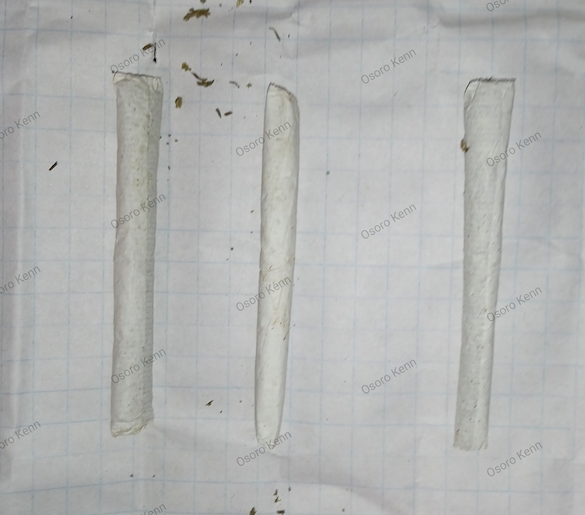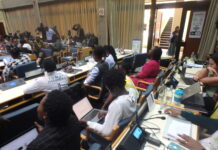By Osoro Kenn
Nairobi, Kenya:They vehemently resist any outsider attempting to deceive or disrupt their laid-back sanctuary. These were the thoughts that crossed our minds as we grappled with uneasiness in an unfamiliar, cramped, illicit brew pub.
Seated next to us are four masculine seemingly addictive men taking alcohol while keen to know us. An identical pub vendor asks what I will take “nikuletee gani?” she asked. This signified that they offer a variety of ‘goodies’.
To prove I am not a narc I quickly order bhang after having been briefed on all the available array of joints, “nipee bhangi tatu- brings three rolls of bhang.”
Unexpectedly, after tendering Ksh.500 note, the bar worker, a youthful but unhurried lady sporting a broad smile and a snugly-fitted skirt, handed back Ksh.470, unmistakably revealing to us that each bhang roll was priced at Ksh.10.
Amidst a self-deluded world with no one yet to provide answers, my curiosity fuels an insatiable sense of inquiry.
The bhang was later surrendered to the office of the Deputy OCS Kibra sub county, Fred Omori.

The recent quarterly report from the National Agency for the Campaign Against Drug Abuse (NACADA) shows that the use of bhang among Kenyans has almost doubled over the last five years. According to the report, one in every 53 Kenyans between the ages of 15 and 65 are using bhang.
We find ourselves captivated by the billowing smoke emanating from the rear of the foul-smelling shanty room situated along the heavily littered, elongated, and narrow entrance.
Meanwhile, one of our colleagues is inquiring with the pub owner while another colleague, who served as my guide on that day, catches up with Rose Ademba, a pseudonym she uses, in the Godham-Bombolulu area of Kibra.
 Despite Rose’s appearance as a middle aged woman in actuality she looks youthful and considers herself a prosperous entrepreneur, discloses that she is responsible for supporting her two children and her dependent siblings.
Despite Rose’s appearance as a middle aged woman in actuality she looks youthful and considers herself a prosperous entrepreneur, discloses that she is responsible for supporting her two children and her dependent siblings.
In a tale portraying profound desperation, Rose, originally a hairdresser, observed that venturing into the world of traditional illicit brewing was far from easy. She expressed her sorrow at having to overcome numerous obstacles before ultimately embracing the illegal brew trade.
“Starting this job was not easy, before then I was a hairdresser, and my mother used to brew and sell chang’aa (illicit liquor). After her demise I had to be responsible and help my younger siblings and my mother’s progenies,” she said.
All these, however, go against John Mututho’s 2010 Alcohol Drinks and Control Act which envisaged proper control of the production, sale, and consumption of any kind of alcoholic beverages in the country.
Section 38 of the law says brewing and sale of illicit liquor amounts to an offense that can lead to a jail term of up to 10 years or a fine of up to Ksh.10 million or both.
For licensed dealers, if the alcohol is contaminated by a harmful substance, the license is forfeited and no new license is granted to them thereafter.
Rose’s ‘job’ has however been met with impediments, according to her, law enforcement agencies have turned a blind eye to the challenges that come with the ‘business’ at a fee.
The mother of two lamented that containing police officers is a daunting task to them, “At times they would just pick you up despite giving them their usual share. The bribe”, she said, the bribes ranges between Ksh.50 to Ksh.200.
She revealed that in a week she gives police officers about Ksh.600. This truncates to about Ksh.2500 a month, equated to Ksh.30,000 a year.
“Majority prefer cash, they avoid MPESA transactions. I once bought an officer airtime instead of giving him cash but I deleted the message. There are some in the name Gitau, Abdi, Monica, and ‘half-court.’”
Further interrogation pushed the middle-aged informal pub owner to admit that there are several illicit brewpubs in the area, on her part, her colleagues are decrying bribery by police officers- “Tuko wengi hapa, hata hawa wamama huwa wanalia wamechokeshwa na maafisa wa polisi- she said in Swahili (Translating to they are many women in the trade who are tired by the police extortion.)
On a further explanation “The last time they arrested me, two months ago, including my colleagues and I were released on a Ksh.5,000 bond each. We avoid such instances by bribing them whenever they come” She detailed.
 The informal pub achieves its maximum capacity during the weekends where Rose makes a profit of between Ksh.800 and Ksh.1000 though these are exclusively illegal profits.
The informal pub achieves its maximum capacity during the weekends where Rose makes a profit of between Ksh.800 and Ksh.1000 though these are exclusively illegal profits.
Even though we are talking about illegality, the middle-aged businesswoman confidently revealed she started the sale of bhang to complement the marginal profits she was experiencing in the illicit liquor. She has notable suppliers who deliver the brew.
“Kuna mwenye alikuja akaniambia ntakuwa nakusaidia kukutengenezea ukiuza” (Translation, There is one guy who approached me and agreed that he would be supplying it to me)
Where it is heading
But this is not the only business of the day, in an attempt to dig deeper into what happens mostly during the weekends apart from chang’aa drinking. Rose hesitantly refuted services on transactional sex when I asked. But after striking a good rapport with her she opened up.
“Sio wewe kwa kwanza kuuliza, kuna wawili washa uliza” (Translation, You are not the first person to ask. Two others have asked for the same services) she says.
“Now that the demand is growing, I will have to start it off and look for potential clients, ntajipanga tuanze pia hio biz nianze sasa kutafuta madems” She added.(Translation She said she was considering starting the business of looking for young girls for her clients.)
 Chances were so high that girls were also being sexually exploited to entertain clients mostly during the weekends in this area. I went ahead and asked whether I could get one client as soon as possible.
Chances were so high that girls were also being sexually exploited to entertain clients mostly during the weekends in this area. I went ahead and asked whether I could get one client as soon as possible.
“Siwezi kuambia ukuje na rada bado ni chafu, lazima ningoje wakam ama nipige pige simu rada ikue safi ndio nikuambie ujitokeze ama ukam” (Translation, The ball is in my court, just take my number, I will be constantly calling potential clients, In case of anything I will then inform you through a call) she explains.
She later insisted that I should call her to get my number “Si uniflash nipate number yako” (Translation, Flash me so I can get your number) she insisted, with a zeal to find me a potential client as soon as possible.
When I asked the best time for this, “Si wanakujanga hapa, sio eti hawakujangi, so kuna hopes,” (Translation, the girls usually come around here enquiring sos there’s hope for the business) she said.
Linking it up with her initial revelation where she said her ‘business,’ thrives on the weekends, she reiterated potential clients do come on Friday, Saturday, and Sunday and the majority of them are below the age of 35 years.
She is so quick to ask about my ‘taste and preference,’ “Tukiongea kwa simu, utaniambia rada gani kama unataka mathe ama rika yako.” (Translation, When we talk on phone you will tell me your preference, if you want someone your age or a woman older than you).
Things started getting out of hand, she became suspicious and was very careful with the conversation going forward.
According to her, such thoughts have never been on her mind, but due to demand, she was out to give it a try. This is because I was the third person to ask for such services.
Surprisingly after the huge amount that was quoted, she changed tunes, she could then cautiously act as a linkage, intimately ‘connect’ us then we agree with the client on the amount of cash for the services.
“They do come for chang’aa but if someone is not interested with them, they keep off-But wako, wanakujanga tu kuchapa kama ni ngwai, kama ni tei, na kama hakuna mwenye amewatongoza si wanaenda, sasa ntawaunganisha tu alafu mnaelewana.” (Translation, there are girls who come to hangaround and they smoke, some want the illicit brew and if there are no men interested in them they leave, but if you are interested I will connect you and you can agree on what you want.)
Our subsequent probe and follow-up proved futile, Rose sensed an anomaly in us and then decided to go silent just before forwarding us an MPESA message of the alleged transaction done to the police officer. She could not even receive our calls anymore.
In the recent economic survey report, 2023, crimes on corruption and offenses involving police officers have slightly declined. These are some of the offenses stipulated in the aforesaid report.
The National Police Service has classified such offenses. For instance, on corruption, there are disciplines related to soliciting bribes, accepting bribes, accepting free-gifts, demanding by false pretense, and other corruption offenses.
From the report, data reveals the two aforementioned offenses have slightly decreased in the past two years.
The reported number of offenses committed by law enforcers noted a 19 percent decline between 2021 and 2022. Corruption cases accounted for the highest proportion within the two categories of offenses.
Despite the decline, an upward trajectory was however recorded between 2020 and 2021 with a marginal increase of 18 more reported cases from 79 cases in 2020, a 23 percent increase.
On the two classifications of offenses- corruption and offenses committed by police- males are fond of falling victims as compared to their female counterparts. In corruption cases, for instance, males accounted for the highest number of reported cases than females.
Out of the 100 corruption reported cases in 2022, close to three-quarters of the cases involved males. The same pattern was denoted in the preceding six years.
Meanwhile, a higher number of reported cases of offenses committed by the police were noted in 2018. Cases recorded by the National Police Service were 591. Out of these, male police officers involved were 78 percent.
Law Enforcement Agencies
It took us several weeks to book an appointment in the office of the area OCS to seek clarification on the allegations made by Rose. On the last day of the appointment, we were kept waiting for about an hour not until we insisted on seeking an audience with the deputy OCS or the OCS.
The deputy OCS Fred Omori admitted and confirmed that drug dealers have invaded Kibra. On the same day, Omori denounced that they were beaten by rowdy youths during a crackdown on illicit brew and restoration of order during a fire outbreak at Katwekera, Kibra.
“If we are chased, thrown stones at, and beaten when we are restoring order, what of doing a patrol to eradicate bhang?” he asked.
Despite the ongoing questionable ‘police raids,’ Omori noted they were yet to make more arrests while blaming the hostile environment as a setback.
They are keen on ensuring minority groups are not affected during their raids, as such, they exercise constraints and use of excessive power even as they long to eradicate the illicit brew and illegal drug.
“We cannot term dealers as fools; it is a business that they prepare themselves to do knowing well we are hunting them down. We have used informers to nab and eradicate both bhang and chang’aa. The process is long overdue.” He reiterated.
The police blame the local community for collaborating with the drug dealers making the suppression of illegal drugs a hard nut to crack. Area residents always violently fight back during arrests and raids.
“We have been fighting these issues; these victims have been arrested and are in court. One from Laini Saba was arrested and fined in court with around Ksh.400,000 cash bail, proceeds of bhang. So many other arrests have also been made.”
The middle-aged businesswoman lamented about bribing her way to keep her illegal business going, as such, several uncouth activities such as sexual exploitation and transactional sex are looming, if not going on. On his part, the Dept. OCS refuted bribery claims and clarified that it was an individual view.
“When officers are in the field, we are not able to ascertain whether they are taking bribes or not,” he said, adding that they haven’t heard of such reports or filed formal complaints.
He however gave an assurance that “once any culprit will be arrested over the same, then he will be taken to court.”
According to Omori they are at times restricted to access interior areas in Kibra. He said, “Most police officers are enemies of the people.”
On our monitory the following day and other two subsequent days in a fortnight, a police vehicle is seen patrolling the same area- in a much more interior area, at ease.
This was an area that was alluded to as difficult to access. An area they said is inhabited by violent extremists and goons who are ready to fight back.

The vehicle was parked near one of the illegal chang’aa pubs in Darajani, Kibra on Tuesday 5, Sept 2023 at around 8:48 AM. People believed to be customers of one of the notorious chang’aa pubs are seen streaming in, a clear indication that it is business as usual, and after a while, the vehicle drove off empty-boarded at the back.
We were however not able to establish what the police officers were specifically up to but what we are sure of is that the illicit liquor pub where the police vehicle was nearly parked was still operational until the time this story was published.
On either looming or ongoing sexual immorality in these pubs, despite noting and terming it illegal, the Dept. OCS averted the claims saying they have no such information on their desk.
Their main concern is, however, the victims who might be under the age of 18 years. He vowed to protect the underage against such crude activities.
“We will protect the under 18 who are taking part in such primitive activities. Those below 18 years are a major concern to the government and are still under care and protection.”
In a bid to fight the eradication of unending illicit brew, mid-this year, a joint operation by the National Police, DCC in collaboration with area chiefs in Soweto saw 4000L of chang’aa destroyed. The operation left area chiefs, D.O., and other officers nursing severe injuries.
“We are working on finding the brewing spot in Kibra and where bhang is packaged. That is when we will be able to cut the supply and eradicate it rather than focusing on those who are selling.” He averred.
The area OCS Thomas Ogeto on her part stated they are experiencing an inadequate number of police officers in the station. At the time, they had no officer manning the police station gate.
On illegal drugs, Ogeto said they are giving it their best. “We even have a bhang exhibit with proceeds of over Ksh.400,000". (The OCS removes and shows bhang rolled in a rectangular-shaped wrapper).
During the recovery operation, they lost a gun, and several police officers also got injured.
Human Rights Eye
On Monday, we visited Haki Africa, at the request of an official who wanted the rot exposed.
“Young girls and boys are recruited from Uganda to take part in illicit brewing mostly along streams in Kibra. They are using dirty sewerage water to add taste to the already harmful alcohol.” Said Fredrick Ojiro- Rapid Response Officer.
It is the nuisance caused by law enforcers and local administrative leaders that triggered him to speak out, amid speculations that it goes beyond drug abuse and transactional sex, what he termed ‘prostitution.’
According to him, local administrations play a crucial role in the sager, they take some fee occasioned by a desire to go get rich quickly, but law enforcement agencies later denied and termed them as allegations.
The pan-African human rights organization was at the time holding discussions with the National Crime Research Center to counter all leaders and officers who might be involved.
The Rapid Response Officer allegedly pointed to a renowned individual involved in the repackaging of illicit brew.
“A wealthy individual is buying illegal liquor and supplying it to different places by use of motorbikes; some are hidden and transported in heavily loaded trucks to Kasarani. These individuals have a brewery processing center where liquor is repackaged and bottled and later supplied to various shops within and outside town,” Ojiro added.
This comes just a month after officials of the National Agency for the Campaign Against Abuse discovered Chang’aa factories in some palatial homes in Nairobi.
The factories, according to investigators, were producing a wide range of alcoholic beverages, from chang’aa to counterfeit spirits.
The officials said they had already, at the time, dismantled two factories, one hidden behind a children's playground.
James Koskei, Nacada’s director of compliance and enforcement, further lamented that stringent action will be taken against all involved.
This story was developed as part of the Transparency International Kenya- Media Tech Hub Project, 2023.














